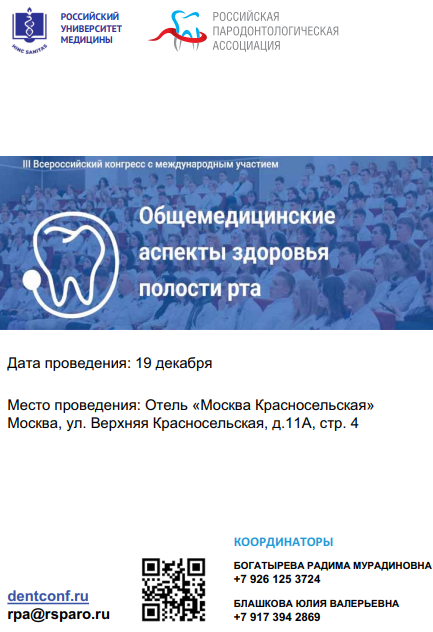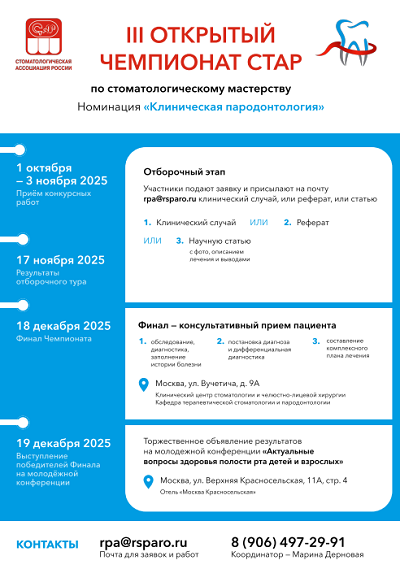Surgical treatment of multiple gingival recessions by the combination of autograftand allogenic lyophilized dura mater: a clinical case
https://doi.org/10.33925/1683-3759-2021-26-2-125-136
Abstract
Relevance. Gingival recession is the apical migration of the gingival tissues associated with the exposure of the roots and alveolar bone loss. The prevalence of single recessions in people over 18 years old is 86.7% whereas multiple recessions, i.e. where all teeth are affected, amount up to 28.6%. High prevalence of the pathology necessitates improvement of the approach and tactic of multiple recession treatment in patients with different phenotypes. Nowadays, the use of autograft is the gold standard of multiple recession treatment. However, the technique has its drawbacks. The purpose of the present work was to assess the response to surgery and evaluate the final result of multiple recession treatment in one subject where the combination of autogenic and allogenic grafts was used in the same study design.
Materials and methods. The paper presents and describes a clinical case where auto- and allografts were used in one patient to treat multiple gingival recessions.
Results. All parameters of the gingival recession assessment showed comparable clinical benefit in all sites of autograft and allograft (dura mater) application. The root coverage was more than 80% around 13 teeth and less than 80% around 11 teeth.
Conclusion. The results of the autograft and allograft (dura mater) application were comparable, response to surgery was the same; besides, the allograft (dura mater) is attractive for combined and independent use during surgical treatment of multiple and especially full-mouth recessions.
About the Authors
M. A. NosovaRussian Federation
Maria A. Nosova, DDS, Saint-Petersburg state medical Polyclinic No. 40 for creative professionals, Clinical consultant of the Dental Shop HAMOMILLA LLC, Clinical consultant on LYOPLAST materials
Saint Petersburg
L. T. Volova
Russian Federation
Larisa T. Volova, DSc, Рrofessor, Сhief researcher, Institute of Experimental Medicine and Biotechnology
Samara
A. N. Sharov
Russian Federation
Alexey N. Sharov, pharmacist, MA in Economics, private researcher, clinical pharmacologist, General Director of Dental Shop HAMOMILLA” LLC, consultant on LYOPLAST materials
Saint Petersburg
D. A. Trunin
Russian Federation
Dmitry A. Trunin, DSc, Рrofessor, Director of Dental Institute, head of the department of Dentistry; President of the Russian Dental Association
Samara
M. A. Postnikov
Russian Federation
Mihail A. Postnikov, DSc, head of the department of operative dentistry, professor at the department of Dentistry
Samara
References
1. Pendor S, Baliga V, Bhongade ML, Turakia V, Shori T. A comparison between connective tissue grafts combined with either double pedicle grafts or coronally positioned pedicle grafts: A clinical study. Journal of Indian Society of Periodontology. 2014;18:326-330. https://doi.org/10.4103/0972-124X.134570.
2. Shanmugam M, Shivakumar B, Meenapriya B, Anitha V, Ashwath B. Clinical evaluation of expanded mesh connective tissue graft in the treatment for multiple adjacent gingival recessions in the esthetic zone. Contemporary of Clinical Dentistry. 2015;6:321-326. https://doi.org/10.4103/0976-237X.161870.
3. Egawa M, Inagaki S, Tomita S, Saito A. Connective Tissue Graft for Gingival Recession in Mandibular Incisor Area: A Case Report. The Bulletin of Tokyo Dental College. 2017;58(3):155-162. https://doi.org/10.2209/tdcpublication.2016-0038.
4. Rijhwani JA, Kini VV, Pereira R, Yadav S. Free Gingival Autograft and Subepithelial Connective Tissue Graft for the Treatment of Gingival Recession: A Brief Review and Report of Three Cases. Journal of Contemporary Dentistry 2016;6(3):225-232. https://doi.org/10.5005/jp-journals-10031-1176.
5. Noncheva V, Dobreva M, Chenchev I. Is Treatment of Gingival Recession Predictable? Journal of Mathematics (IOSR-JM). 2016;12(5)Ver.V:07-11. https://doi.org/10.9790/5728-1205050711.
6. Ahmari F. Al. An Acellular Dermal Matrix Allograft for Treatment of Multiple Gingival Recession Defects: A Case Report. Journal of Dental Health, Oral Disorders and Therapy. 2018;9(1):00328. https://doi.org/10.15406/jdhodt.2018.09.00328.
7. Garcıa-Mendez MC, Rodrıguez-PulidoJI, Sandoval GM, Garza-Enriquez M, Gomez-Butzman L. Management of Miller-Class I and III gingival recessions through different techniques combined with connective tissue graft: a case report. Journal Of Clinical Periodontology. 2018. PCS107. https://doi.org/10.1111/jcpe.106_12916.
8. Isler SC, Ozcan G, Ozcan M, Omurlu H. Clinical evaluation of combined surgical/ restorative treatment of gingival recession- type defects using different restorative materials: A randomized clinical trial. Journal of Dental Sciences. 2018 Mar;13(1):20-29. https://doi.org/10.1016/j.jds.2017.09.004.
9. Sculean A, Cosgarea R, Katsaros C, Arweiler NB, Miron RJ, Deppe H. Treatment of single and multiple Miller Class I and III gingival recessions at crown-restored teeth in maxillary esthetic areas. Article in Quintessence Publishing Deutsch landinternational. 2017;10:777-782. https://doi.org/10.3290/j.qi.a39031.
10. Stein JM. Decision-Making in Surgical 7 Management of Gingival Recession. part of Springer Nature. 2018:83-95. https://doi.org/10.1007/978-3-319-70719-8_7.
Review
For citations:
Nosova MA, Volova LT, Sharov AN, Trunin DA, Postnikov MA. Surgical treatment of multiple gingival recessions by the combination of autograftand allogenic lyophilized dura mater: a clinical case. Parodontologiya. 2021;26(2):125-136. (In Russ.) https://doi.org/10.33925/1683-3759-2021-26-2-125-136




































